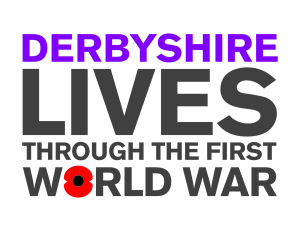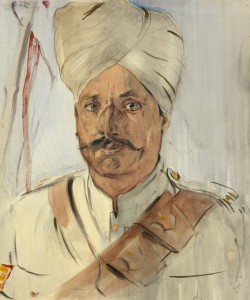 The Derbyshire Record Office is offering a series of training sessions that are aimed at community heritage groups looking to commemorate the anniversary of the First World War. However, they are open to anyone who is interested. The sessions will be half days based at the Record Office in Matlock. They cost £3 per person, not including refreshment. If you wish to sign up for any of the training sessions, please phone the Record Office on 01629 538 347.
The Derbyshire Record Office is offering a series of training sessions that are aimed at community heritage groups looking to commemorate the anniversary of the First World War. However, they are open to anyone who is interested. The sessions will be half days based at the Record Office in Matlock. They cost £3 per person, not including refreshment. If you wish to sign up for any of the training sessions, please phone the Record Office on 01629 538 347.
Details of the individual sessions are below:
A Guide to Copyright
12th March, morning, 10.00 – 12.30
21st April, afternoon, 1.30 – 4.00
Paul Beattie, Archivist, Derbyshire Record Office
Paul is the longest serving Archivist in the Record Office with 15 years’ experience. He has an extensive knowledge of the collections and understanding of the legislation surrounding them, particularly the new orphan works copyright legislation.
The Copyright session will be aimed at helping you understand more about the recent changes in copyright regulations and where that leaves heritage and community groups who wish to publish images and articles, or anything else which may be under copyright. What can you do? What can’t you do? What is right and what is copyright?
A Guide to Digitising your Images
12th March, afternoon, 1.30 – 4.00
21st April, morning, 10.00 – 12.30
Nick Tomlinson, Picture the Past
Nick has a commercial background in computing, data handling and image digitisation. He has been at Picture the Past for 13 years, managing the creation of the project and overseeing the inclusion of over 114,000 searchable images to its database.
This session will provide a simple guide to what to aim for when considering scanning your images. It will include file types, resolution, output sizes and suggested scanner settings. Come and find out the best way to digitise your images to suit your purpose.
Researching WW1
25th March, morning 10.00 – 12.30
27th May, morning 10.00 – 12.30
Karen Millhouse, Archivist, Derbyshire Record Office
Karen has six years’ experience as an Archivist at the Record Office, having previously served as Assistant Curator, Maritime Collections at the Maritime Museum, Liverpool.
The Research session will help you to find the information you want. It will give guidance on where to find and how to use historic records. There may be documents and sources that you have not thought about, or were not aware of. The session will help you find the information most relevant to your needs.
Exhibitions & Preservation
15th April, (2 courses)
Morning 9.30 – 12.45
Afternoon 1.15 – 4.30
Karen Millhouse, Archivist, Clare Mosley, Assistant Conservator, Lien Gyles, Senior Conservator, Derbyshire Record Office;
Karen is responsible for the Record Office community outreach programme and the collection displays in the exhibition cases at the Record Office.
Clare has six years’ experience at the Record Office and has a foot in both exhibition and conservation camps. Clare has helped Karen arrange many displays of the Record Office collections over the last two years, but her main role is as Assistant Conservator.
Lien has twenty years’ experience as an archive conservator and is responsible for the preservation of the collections at the Record Office.
The combined Exhibition and Preservation session will give you ideas for how to present an interesting and informative display based upon your photos and ephemera and will explain how to ensure that they will still be around for the bi-centenary. It will show how to make the best out of possibly limited material and resources to create an attractive and interesting display. The preservation training will ensure that you know the best way to handle and display historic items so that they do not suffer inadvertent damage. What might be harmful to the artefacts you have and what should you do to help preserve them for future generations? Find out at this informal, hands-on workshop.
Oral History
18th May 9.30 – 12.45 & 1.15 – 4.30
Colin Hyde, East Midlands Oral History Archive Outreach Officer, University of Leicester
The East Midlands Oral History Archive is recognised as a leader in the subject of oral history. Colin’s involvement with oral history goes back to the original Leicester Oral History Archive which was set up in 1983. Colin advises on all aspects of oral history work. He has worked with many community organisations in Leicestershire & Rutland, giving talks, training sessions, retrieving existing oral history recordings, and encouraging and supporting new work.
The session will provide you with the skills and information you need to undertake your own oral history project within your community. What equipment do you need? What questions do you need to ask? What should you do with your recordings.
Applying for HLF ‘First World War: then and now’ funding
30th March, morning, 10.00 – 12.30
8th April, morning, 10.00 – 12.30
Glynn Wilton, Derbyshire Lives Through the First World War, Project Officer
Glynn is employed by Derbyshire Record Office to help community groups commemorate the anniversary of the First World War, from the creation of a project idea, to the application for funding.
Glynn has 30 years’ experience of working in museums, interpreting collections, creating exhibitions and applying for funding. The session will help ensure that you meet the outcomes required for a successful project, it will give you the skills to develop your idea and complete a funding application.
 The Derbyshire Record Office is offering a series of training sessions that are aimed at community heritage groups looking to commemorate the anniversary of the First World War. However, they are open to anyone who is interested. The sessions will be half days based at the Record Office in Matlock. They cost £3 per person, not including refreshment. If you wish to sign up for any of the training sessions, please phone the Record Office on 01629 538 347.
The Derbyshire Record Office is offering a series of training sessions that are aimed at community heritage groups looking to commemorate the anniversary of the First World War. However, they are open to anyone who is interested. The sessions will be half days based at the Record Office in Matlock. They cost £3 per person, not including refreshment. If you wish to sign up for any of the training sessions, please phone the Record Office on 01629 538 347. One of our main aims at the Centre for Hidden Histories is to support local groups and societies keen to commemorate the role of their communities in the First World War.
One of our main aims at the Centre for Hidden Histories is to support local groups and societies keen to commemorate the role of their communities in the First World War.